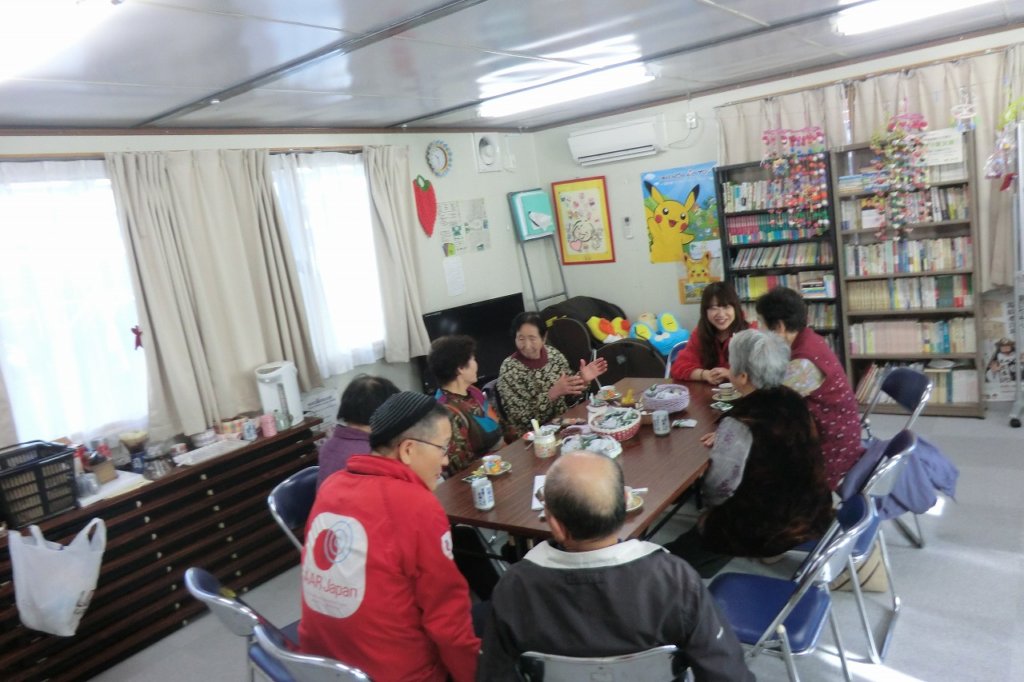By Anna Kajino | Programme Coordinator
It has been almost five years since the Great East Japan Earthquake. Assistance and efforts have been made in rebuilding the debilitated communities; the construction of disaster recovery housings is underway; the planning of collective relocation of survivors who remain at risk of potential disasters in the foreseeable future is being formulated. The ground preparation for ensuing construction work for housings is being carried out, which is yet to be completed. The extensive delay in advancing the reconstruction work is inevitably keeping the displaced populations in Iwate, Miyagi and Fukushima prefectures, amounting to 180,000 persons, stuck in temporary housings. (December, 2015. Reconstruction Agency of the Japanese Government)
This month’s report will share with you the current situation of a temporary housing complex in the city of Koriyama in Fukushima prefecture. The Earthquake of magnitude 9.0 shook the entire Tohoku region, subsequently triggering monstrous tsunami waves that caused a series of blasts and ultimately meltdowns at the Fukushima Daiichi Nuclear Power Plant. Approximately, 20,000 persons who had resided in the town of Namie along the coast line were displaced. A public office for Namie town was put up in the city of Nihonmatsu for temporary operations. To this day, the residents of Namie town are dispersed and displaced at different temporary housing complexes.
Since the immediate aftermath of the nuclear power plant accident, AAR Japan has visited temporary housing complexes on a consistent and regular basis to ensure the mental/physical well-being of the survivors are well taken care of.
On January the 24th, 2016, our team consisted of two physio therapists and two counselors visited a temporary housing complex that hosts 24 families who cannot go home because of the evacuation order that is still in place. Their city has been cleared of radioactive contamination and public housings have been constructed to its completion which will open this autumn. Nonetheless, more than half of the displaced populations seem disinterested in registering for the lottery to win their space at this newly-built housing. The reason being that recovery of other public services is stagnated and they are not in full operation to serve the community.
The majority of the displaced populations is about to go into their fifth year in temporary housings. Unavoidable limitations on physical mobility and freedom have taken their tolls on the health of the displaced who are predominantly farmers and carpenters by occupation. The massage therapy, through the skin-to-skin contact, loosens the internal tension in their bodies and alleviates the mental anxiety. By providing massage, the physio therapists also find out the extent of stress and physical conditions of these residents.
While waiting for their turn, people exchange friendly conversations with AAR staff over a cup of tea and snacks. This recreational tea time for the purpose of building relationships with one another is the tradition called Ochakko, unique to the Tohoku region. To this, we add a trick to minimize the interpersonal distance and to facilitate people to connect with one another. Everyone is expected to prepare a cup of coffee for someone else, from grinding coffee beans, brewing it and pouring into a cup to serving it on the table. This simple activity springs up a conversation and breaks an awkward tension to interact. The counsellors sit down and join the conversation. Their mere presence and tuned-in attentions to people’s concerns alleviate a sense of distress and frustration and to feed positivity at the table.
The following are the voices of those who participated in Ochakko and the massage therapy:
“Decontamination of radioactive substances is being done in my hometown area and I am happy that I am allowed to go home for a little bit during the daytime. On the flipside, I am saddened to see my house exactly the same way I left it when I first evacuated almost five years ago. There are weeds all over my garden.”
“While I was in my house, I tried to clean up all the mess but I am old and my back is very weak. I wish someone would help me carry things around but everyone is very busy.”
“I feel excited at the prospect of finally moving back to my own house. But I am very concerned that hospitals, grocery stores and other necessary places are not open. Even if I move back, I am not sure if I will be able to live as I used to.”
We always receive words of appreciation from these people when they come to Ochakko and massage therapies we provide in the temporary housing complexes where they live. In the midst of ambiguity over the prospect of future livelihood, a number of displaced persons feel anxious. AAR Japan will continue to visit these people at temporary housings to provide support that they need.
Project reports on GlobalGiving are posted directly to globalgiving.org by Project Leaders as they are completed, generally every 3-4 months. To protect the integrity of these documents, GlobalGiving does not alter them; therefore you may find some language or formatting issues.
If you donate to this project or have donated to this project, you can receive an email when this project posts a report. You can also subscribe for reports without donating.


